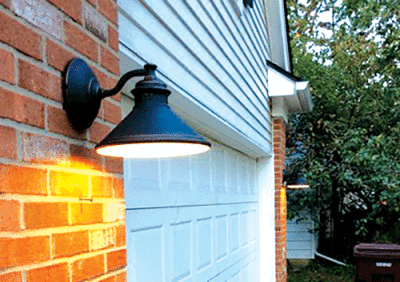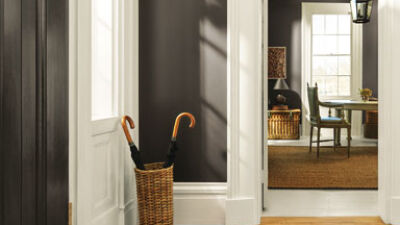
Putting shields on lights to prevent the light from shining up into the sky or into another property is one of many ways the public can fight light pollution.
Photo provided by Sally Oey
METRO DETROIT — Lights can make nights brighter, safer and more accessible, but many people want the public to be mindful of the light they shine out into the darkness.
The concern is what is called “light pollution,” which is light that ends up negatively affecting the surrounding environment for either humans or the ecosystem.
Sally Oey is a professor at the University of Michigan in its astronomy department. She also is a coordinator for Michigan Dark Skies, an organization begun in 2017 dedicated to educating people about light pollution and promoting action.
“Light pollution is light that is not wanted and not serving any purpose. Like any other sort of pollution, it’s a byproduct of light we don’t need,” she explained. “If you are lighting up your yard while you’re using it, there also could be light going into your neighbor’s window. That is light trespass.
“There also is sky glow, which is light that goes up into the sky. That is caused by lighting from cities. It doesn’t serve any purpose if it’s just going up into the sky. This can be a real problem for the ecosystem because night is disappearing, and there are animals that require night. Humans are included. We are animals who need dark, too, since we need the night to sleep.
“There also is glare, which is when you have a very bright light in contrast to a very dark surrounding. If a car is approaching you with their high beams on on a dark country road, that is glare, since it can stop you from seeing what is ahead of you.”
Light pollution is a natural concern for an astronomer as it can often hinder observing the night sky. However, there are far more destructive results caused by light pollution, as well.
“Artificial light at night is a complete change toward the ecosystem,” said Oey. “Humans are daytime creatures. We protect ourselves by what we can see. The nocturnal ecosystem is necessary so animals that are active at night can function. … Birds in particular are very sensitive to light pollution. We’ve seen a 25% drop in the bird population in the last 50 years. Birds get very disoriented due to light pollution. The second largest cause of bird death is building collision, and part of this is because light can disrupt their natural navigation abilities. Up to a billion birds are killed annually in North America, and light pollution is a significant cause of that.”
Kevin Arnold, the southern district interpretive supervisor for Huron-Clinton Metroparks, agreed with Oey’s assessment.
“As far as nocturnal animals and migratory birds go, there haven’t been a lot of studies done, but we have noticed how light pollution can pull migratory birds off course and can pull them into big cities with lots of lights, and they have a lot of incidents where they can collide with buildings,” he said. “This reduced bird numbers, especially since many migratory birds do their traveling at night. On one particular day in Chicago, they collected 50,000 dead birds in a single day all from building collisions.”
Insects also can be drastically affected by excess light.
“Folks are used to seeing street lights on and bats flying around them because the lights attract lots of insects,” said Arnold. “This actually means that there are steep drops in insect populations, as well, since they become such easy prey for the bats.”
“About 40% of insect populations are in drastic decline,” added Oey. “Light pollution contributes to this. People are still studying all of these effects, so it’s hard to say what the full impact of this is, and light pollution can affect insect populations differently. Light pollution can make insects in their juvenile larvae state more visible and get consumed by predators. Fireflies won’t do their mating process, which includes them lighting up if it’s brighter out.”
Both said that light pollution can have numerous effects that most people don’t ever consider.
“Light pollution really does affect the entire ecosystem,” said Oey. “Trees don’t drop their leaves as quickly if they are lit up all of the time. I saw this at a local church, where there was one tree that was lit up all the time and one that wasn’t, and you could see two trees of the same species at different portions of their yearly cycle just because of a difference in light.”
“Light pollution affects everything differently. Things that can seem like a positive effect can have some big downsides,” added Arnold. “When sea turtles hatch, this can affect their ability to make it to the water. They base their sense of direction on the moonlight on the water and the light from cities can disorient them and leave them stranded on the beach, where they can be vulnerable to predators or they can dry out and dehydrate if they are still on the beach when the sun comes out.”
Michigan Dark Skies has taken some action in communities such as Ann Arbor to try to fight excess light on a city-wide scale.
“Our most prominent accompaniment was helping to promote an Ann Arbor ordinance to prevent trespass onto other properties and that all fixtures should be fully shielded, which means light shouldn’t be going upward and it should be pointed toward the ground, where it’s actually useful,” she said. “It also says that lights shouldn’t be on all night and they have to be turned off within a half hour of the business closing. There’s also a provision to keep the lighting warm and yellow in color. Bright lighting, or more white lighting, can be harder for your eyes to adjust back to the dark. It all applies to lighting on private properties.”
Oey said there are numerous methods people can use to reduce excess light in their own lives.
“While LEDs are great in that they can help save energy, if that light is being wasted, we aren’t really saving energy,” she said. “The simplest thing people can do is look at their own lighting and see if their lighting actually serves what they need it to be doing or if there is excess. Is it brighter than it needs to be? Is it whiter than it needs to be? Is it going anywhere it doesn’t need to be? You can shield your lights, and that means putting blockers that prevent the light from going upward. You can put lights on timers or motion sensors. You can switch them out to be a softer light. You can also just talk to others about this topic.”
 Publication select ▼
Publication select ▼





















